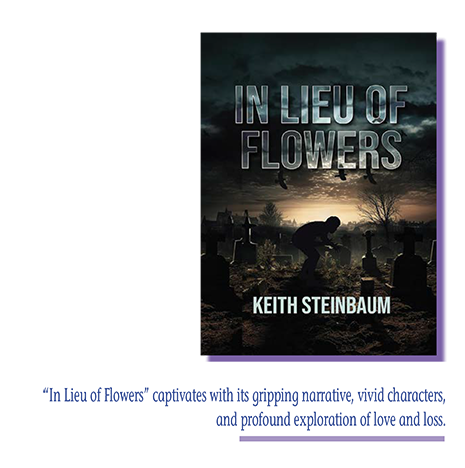From Lyrics to Literature
Keith Steinbaum discusses his transition from songwriting to novel writing, exploring themes of supernatural suspense and social issues, while drawing inspiration from personal experiences and real-life scenarios.
Keith Steinbaum’s journey as a writer is as compelling as the stories he crafts. With a background that spans poetry, song writing, and a lengthy career in the landscape industry, Steinbaum’s path to becoming an award-winning author is a testament to his unwavering passion for storytelling. His novels, including “The Poe Consequence,” “You Say Goodbye,” and the recently released “In Lieu of Flowers,” showcase his unique ability to blend supernatural elements with human drama, creating narratives that are both thrilling and thought-provoking. Steinbaum’s work often delves into complex social and ethnic issues, reflecting his belief in the power of literature to explore and illuminate the weightier aspects of life. In this interview, we delve into the inspirations behind his novels, the influence of his song writing background on his writing style, and the themes that drive his creative process. Join us as we explore the mind of a writer who has seamlessly transitioned from crafting lyrics to penning novels that captivate and challenge readers.
You transitioned from a successful career as a song lyricist to becoming an award-winning author of supernatural thrillers and murder mysteries. How did your background in songwriting influence your writing style and storytelling in your novels?
One thing I want to clarify from the beginning is that, unfortunately, my career as a song lyricist shouldn’t be termed, “successful.” Some highlights, yes, but not nearly enough to safeguard me from the eventual need to seek another career. However, through those 100+ lyrics (and many poems written earlier), I learned that creative writing originates from the ability to first look inside yourself and isolate the motivating reason(s) for what and how you want to say something. My second novel, You Say Goodbye, features a protagonist who is a former rock ‘n roll star and that vehicle allowed me to write passages of lyrics from songs he’d written and thought about when confronted by a particular experience. This was a very important factor in familiarizing him to the reader, exposing his depth and sensitivity despite being admittedly unlikable for the first half of the story.
The Poe Consequence deals with themes of gang violence and supernatural elements. What inspired you to blend these two worlds, and what message do you hope readers take away from the story?

During the period of time that these “two worlds” formulated, I had already worked in various gang-affiliated neighborhoods for close to twenty years – but only during the daytime as a landscape professional in many housing projects. The gang-banger types I observed at these complexes, or in the streets around the neighborhood, stuck with me. Managers and supervisors told me of incidents involving killings, rape, and drug dealings, and this fueled an inner fire to create a story of supernatural vengeance against two rival street gangs. Being an Edgar Allan Poe fan, I wondered if something from his dark themed stories could offer a clue as to what I could create. Upon re-reading The Tell-Tale Heart, that turned out to be the ‘ah-ha’ moment. By the end of the story, I hope that readers will come away with, as I write near the end, the belief that one’s life can, “change for the better in the most unlikely of situations, at the most unexpected of times, and in the most unpredictable of circumstances.”
Your upcoming novel, In Lieu of Flowers, is described as a time-traveling cemetery story. Can you give us a sneak peek into the plot and explain how it connects past, present, and future events?
One of the ways I describe In Lieu of Flowers is as a supernatural horror story explanation for the real-life horrors of man’s inhumanity to man—past, present, and, unfortunately and undoubtedly, the future. The evil, immortal entity that gets introduced to the reader in Chapter One is the connecting force between what starts in 1920 Bucharest, moves into 1943 Benghazi, Lybia, and concludes in 2017 Los Angeles.
In You Say Goodbye, the concept of a Beatles Song Murderer is both unique and chilling. What drew you to create a serial killer with such a specific motif, and how did you develop the intricate plot around this idea?
I first had my two main characters developed enough to feel that they were ready for a story. One was an aging, bitter, ex-rock star, and the other a ten-year-old neighbor girl fighting cancer. I knew that this dynamic offered interesting ideas for their developing relationship, but also understood that they needed to be placed in a situation that took them into an entirely different and edgy literary situation if I was to grab the interest of a wider array of readers. That’s where the idea of a murder mystery featuring a serial killer came into play, involving the ex-rocker throughout the story, and eventually the little girl. Because of my protagonist’s musical background, I devised a plot line to take the most popular group in rock history, The Beatles, and make their lovable brand take a nosedive into darkness by attaching their name to a serial killer who leaves behind titles of Beatles songs as his calling card.
Your books have been recognized for addressing social and ethnic divisions. How do you approach integrating these complex issues into your narratives, and why is it important for you to explore these themes through your writing?
I’ll reply to the second question first, and, with apologies, it’s best answered in a quote from my website: “Light-hearted inspiration is certainly an enviable reason to tap into one’s creative juices, but those feelings don’t stimulate the kinds of thoughts that lodge within me and grow in complexity. I can pinpoint a tragic, life-changing event that occurred in my mid-teens that transformed me into a writer, and it seems that the weightier side of life continues to be my motivation.” As for how I approach integrating these types of issues into my storylines, I feed on creativity that stems from real life scenarios we’re all familiar with and place my fictional characters into those roles. It doesn’t have to be historical fiction as we’ve come to familiarize ourselves with that term, such as merry old England, because everyday life, whether good, bad, or indifferent, also creates a history of its own. When my thoughts finally captured the core ideas for my three novels, real life issues of the day, personal, social, or worldwide, gave me plenty of ammunition to work with, such as racism, alcoholism, bullying, and hate crimes. But, and this is important, also life enhancing emotions such as love, hope, and redemption.
In Lieu of Flowers follows in the footsteps of dark classics like Dr. Jekyll and Mr. Hyde and The Exorcist. What aspects of these classics influenced your novel, and how do you balance paying homage to these works while bringing something new and original to the genre?
In Lieu of Flowers involves obsession of an individual and ultimate possession of their mind, body, and soul. This is also true for the two novels you mention. In Dr. Jekyll and Mr. Hyde, the chemically induced dark figure of Mr. Hyde obsesses over the prostitute/stage dancer Lucy, craving to possess her mind, body, and soul. In The Exorcist, the mind, body, and soul of the young girl, Regan MacNeil, becomes possessed by a demon that many might refer to as the Devil. A major difference in my novel from these other two is that the obsession and possession factor for my antogonist covers a span of nearly 100 years, beginning in 1920 Bucharest and concluding in 2017 Los Angeles, regardless of the fact that the victim is dead.



